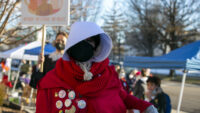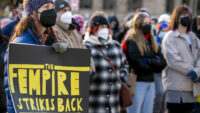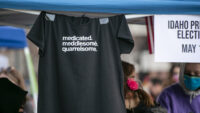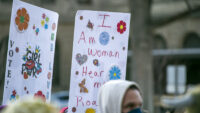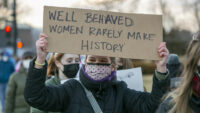BOISE — Petra Hoffman was only 11 years old when she attended the first Women’s March in Idaho.
She remembers the sheer size of the rally, captured as a time-lapse on her mother’s phone as thousands of people walked down streets in Boise.
The high school junior stood on the steps of the Idaho State Capitol on Saturday afternoon, helping lead a similar, smaller crowd under very different conditions with the help of other high school students.
“Today again. I was like, ‘Oh my god,'” Hoffman said. “So many people still care.”
For one, the march did not parade through Downtown Boise. Instead, organizers led attendees in a march on the sidewalks surrounding the Capitol. The march had citizens trained in talking to police and counterprotestors, high school senior Sneha Sharma told attendees.
A mostly masked crowd of a few hundred people waved hand-made signs and cheered as organizers spoke. The event took place on the anniversary of the landmark Supreme Court decision Roe v. Wade, which required abortion access.
“We’re at an interesting time in history where Roe v. Wade is under attack, where there’s extremism in our Legislature … where people aren’t believing women, or believing in COVID, or believing in education or believing in talking about racism,” Hoffman told Idaho Education News after the march. “But I think coming together today is a way to say that, ‘women won’t stand for this, because we’re not going backwards. We want to go forward.'”
Presenters connected other movements to feminism, promoting intersectional thought, and reflected on recent Idaho political moments.
Lisa Sanchez, a Boise city councilor, praised the teenage legislative intern “Jane Doe,” who accused former legislator Aaron von Ehlinger of rape, leading to his resignation.
“I am inspired by people like Jane Doe because I myself am a survivor of sexual assault,” Sanchez told the crowd. “But I wasn’t as brave as Jane because I did the math in my head like, ‘No, I’m not going to be believed. Why would I put myself through trauma again?'”
A political organizer promoted free stickers with “Medicated, meddlesome and quarrelsome,” the words from Boise State University professor Scott Yenor that sparked backlash late last year for being anti-woman. When Emily Walton, co-founder of anti-extremist group the Idaho 97 Project, mentioned Yenor’s name, the crowd booed in unison.
“Are we ready to leave public life?” Walton asked critically of Yenor’s comments, which also said higher education should be de-emphasized in the interest of preserving the family.
“No!” the crowd yelled.

